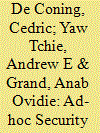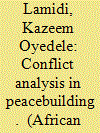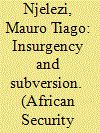|
|
|
Sort Order |
|
|
|
Items / Page
|
|
|
|
|
|
|
| Srl | Item |
| 1 |
ID:
189281


|
|
|
|
|
| Summary/Abstract |
This article contends that Ad-hoc Security Initiatives (ASI) have developed over the last decade in the Sahel and Lake Chad Basin and represents a new form of African collective security mechanism. The G5 Sahel Force and the Multi-National Joint Task Force emerged from a context-specific need for small clusters of African states to respond collectively to a shared cross-border security threat(s). The existing African Peace and Security Architecture (APSA) mechanisms were not specific and responsive enough to meet this emerging need. Despite substantial investments over the last twenty years by the African Union, Regional Economic Community/ Regional Mechanisms and international partners to establish the African Standby Force, this instrument was not agile enough to respond to the type of threats experienced in the greater Sahel region. In this article, we trace the emergence of a new type of ASI, examine how they fill an essential gap and analyse why the African Standby Force was not able to meet this need. We then consider the implications of these developments for the future of the APSA and how closer collaboration between ASIs and APSA can be developed.
|
|
|
|
|
|
|
|
|
|
|
|
|
|
|
|
| 2 |
ID:
189282


|
|
|
|
|
| Summary/Abstract |
Studies have examined the dimensions and components of conflict analysis. However, little or no review attention has been paid to understanding the conceptual perspectives, theoretical underpinnings and methodological issues. Hence, this paper aimed at filling the gaps and answered the basic questions: Is conflict analysis a potential tool for peacebuilding? In what ways does conflict analysis influence the practice of peacebuilding? How can conflict analysis cover the limitations of peacebuilding? Using secondary data sources, this paper underscored the perspectives and theoretical discourse which underpin the context and structural dynamics of conflict analysis. It also discussed methodological issues by exposing its different levels of practical benefit. Evident examples of conflict analysis were reviewed with notable instances in Africa. This paper, therefore, found out that conflict analysis has great potential for facilitating positive value and social coherence for peacebuilding practices. On the one hand, the outcome of conflict analysis has a direct response to the implementation of peacebuilding strategies. On the other hand, conflict analysis exposes complementary problems resulting in the limitations of peacebuilding. Also, this paper contributed to knowledge by remedying the limitations of peacebuilding. It concluded that a broad participation network would guarantee insightful conflict analysis towards the enhancement of peacebuilding.
|
|
|
|
|
|
|
|
|
|
|
|
|
|
|
|
| 3 |
ID:
189280


|
|
|
|
|
| Summary/Abstract |
The South African National Defence Force (SANDF) has been faced with a declining budget for many years, resulting in the deterioration of prime mission equipment, inability to upgrade critical infrastructure, and a very limited capacity to recruit, train, maintain, and deploy forces. This paper argues that the military can alleviate the impact of budgetary constraints through a systematic and structured sweating of land assets under its control. It articulates the rationale for embarking on such an initiative, while proposing approaches and models for the decision-making process. It also highlights the risks of inaction based on precedents in other countries.
|
|
|
|
|
|
|
|
|
|
|
|
|
|
|
|
| 4 |
ID:
189279


|
|
|
|
|
| Summary/Abstract |
Resulting from several social, political, economic and above all radical Islamic factors, the armed conflict in Cabo Delgado raised a variety of questions in the national and international system, among them the modus operandi of the group, now called Ahlu Sunnah Wa-Jammá. Thus, the present article analyses the way in which the modes of insurgency and subversion help to understand the modus operandi of the Ahlu Sunnah Wa-Jammá. For this purpose, a methodological study was established in which the semi-structured interview technique involved officers and documentary analysis for data collection. The results of the study show that the modus operandi of the Ahlu Sunnah Wa-Jammá is circumscribed to the organisation of numerous semi-autonomous cells which carry out guerrilla, terrorist and subversive actions. Furthermore, it was highlighted that the conflict was initiated by a minority of individuals subordinate to a radical religious ideology, and the objective of its operationalisation, until then, was carried out in three phases: preparatory, agitation and insurrection.
|
|
|
|
|
|
|
|
|
|
|
|
|
|
|
|
| 5 |
ID:
189283


|
|
|
|
|
| Summary/Abstract |
The emergence of the COVID-19 pandemic brought about a myriad of responses on the global, regional and national levels. One of the widely adopted measures of dealing with the scourge was the crafting of stringent regulatory frameworks to curtail the spreading of the virus through restriction of citizens’ movement. The role of the police services and, importantly, the military, came under spotlight, as they were instrumental in enforcing COVID-19 containment-related laws. The confinement of people to their homes, as well as the enforcement of the restrictive regulations, led to a paradigm shift in the crime trends. More often, the police and the military had to contend with allegations of various criminal activities and human rights violations. In this paper, which was based on a documentary survey, we discuss the policing environment during the COVID-19 era. We focus on how the COVID-19 era has altered the criminal environment, focusing on criminal activities by both the public and the law enforcement agents. We also explore the human rights implications of the enforcement of COVID-19 containment regulations.
|
|
|
|
|
|
|
|
|
|
|
|
|
|
|
|
| 6 |
ID:
189284


|
|
|
|
|
| Summary/Abstract |
This study discusses the human security costs and benefits generated by the coronavirus (COVID-19) pandemic-induced state monopoly on the urban public transport system in Zimbabwe through the Zimbabwe United Passenger Company (ZUPCO) since March 2020. Using empirical evidence from Harare, it argues that the ZUPCO initiative had far-reaching safety and security implications on urban residents’ lives during the COVID-19 pandemic. The study found that though the ZUPCO initiative mainly benefited commuters through affordable fares, it had many human security costs. The costs included reduced safety and decreased and unreliable services, which exposed the commuting public to the risk of contracting COVID-19 and other security challenges. The state monopoly on urban transport exacerbated the social and economic impact of COVID-19, promoted inequalities, police corruption and urban residents’ use of informal transport services, which were unsafe and costly. The study concludes that the Zimbabwean government lacks the capacity to provide services in the urban transport sector, akin to nearly every sector in the country. As a stop-gap measure, the government is encouraged to regulate and allow private players to complement its efforts for the benefit, convenience, security, and safety of commuters until it develops an efficient urban public transport system.
|
|
|
|
|
|
|
|
|
|
|
|
|
|
|
|
|
|
|
|
|